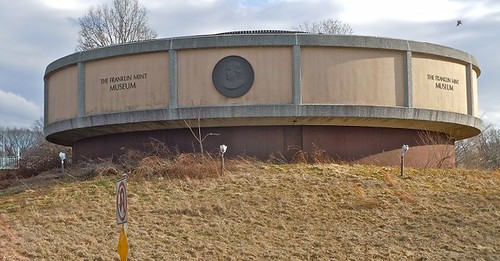
PREV ARTICLE
NEXT ARTICLE
FULL ISSUE
THE NUMISMATIC LEGACY OF THE FRANKLIN MINTLou Golino published a great article January 3, 2020 on "The Franklin Mint's legacy for modern numismatics." Here are some excerpts, but be sure to read the complete article online - it's a very thorough treatment of all sides of the situation. -Editor  The since-demolished Franklin Mint Museum next to the former headquarters in Wawa, Pennsylvania. For legions of American coin and medal collectors who came of age numismatically from the 1960s to 1980s, the Franklin Mint was a fixture of the hobby. Based in Wawa, Pennsylvania (outside Philadelphia), the company and its products were a staple of advertisements in newspapers and hobby periodicals for decades starting in the mid-1960s. The company, which later changed hands many times and no longer issues its own coins, but whose brand still exists today, was a significant commercial success during most of the past half-century with sales reaching over $1 billion in 2000. But many of its collectible products were overpriced and eventually lost most of their premium over precious metal content, leaving its many customers dismayed at the amount of money they had lost. However, some buyers did well if they purchased silver items early on when silver was much less expensive than it would become over time, especially in January 1980. And the mint, which, in its heyday in the 1970s and 1980s, was the largest privately-owned mint in the world and had a half million subscribers to its monthly magazine. It helped pave the way for the explosion of non-circulating legal tender commemorative coins issued in recent decades. It also impacted modern numismatics by setting the precedent of legal tender coins being issued by a private mint on behalf of other countries — a trend that continues to grow as numerous companies that specialize in bullion and collectors coins develop partnerships with mints around the world. In fact, some of the most popular recent coin series such as the Australian wedge-tailed eagle that debuted in 2014 and just launched its fifth design by former U.S. Mint Chief Engraver John Mercanti came into existence this way. In addition, the mint helped to increase interest in collecting medals, which had fallen out of favor with collectors during the coin craze of the 1960s, and it was the first to use silver that had been to the moon to produce coins, another practice that continues to be used today. The company's commercial success, including rising annual sales and a massive increase in the value of its stock, was based on several key factors. First, Segel had the foresight to purchase a large amount of silver bullion prior to the meteoric rise of the spot value of that metal in 1979-1980 and to hedge the metal later, which was essential when keeping the issue price of items stable over time. That would prove to be one of his best business decisions See the complete article, linked below. The "Keys to Success" and "Lessons for Numismatics" sections are spot-on. Here's a question for readers - would anyone have a complete run of the Franklin Mint's magazine? Perhaps the successor company would allow it to be digitized on the Newman Numismatic Portal, where it could be of use to future researchers. -Editor To read the complete article, see:
Wayne Homren, Editor The Numismatic Bibliomania Society is a non-profit organization promoting numismatic literature. See our web site at coinbooks.org. To submit items for publication in The E-Sylum, write to the Editor at this address: whomren@gmail.com To subscribe go to: https://my.binhost.com/lists/listinfo/esylum All Rights Reserved. NBS Home Page Contact the NBS webmaster 
|